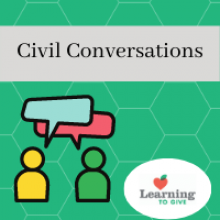Civic Skills
These guides teach the knowledge and skills of responsible citizenship to grow agency for using our voices, having critical conversations, and making informed decisions.
Voting and Civic Participation
Civic education includes teaching the knowledge necessary to engage responsibly as a citizen, including how government and voting work, following current events, listening to diverse points of view, having critical conversations, and advocating for a cause. This toolkit includes background information and project ideas related to these elements of civic participation.
Michigan Voter Participation
- Michigan needs poll workers. You can serve if you are 16 or older. Learn more.
- Sixteen-year-olds in Michigan and some other states can preregister to vote. Before young people turn 18 is a great time to preregister while they are learning about the voting process in Civics classes and in dinnertime conversations. Request a form from your local clerk or at Michigan.gov/Vote
- This Michigan Voting Guide outlines valuable resources and information for youth who are getting ready to vote or are interested in civic engagement in other forms.
Critical Conversations
Talking about important topics sparks the best critical thinking as well as the strongest opinions. When conversations about critical topics are based on informed facts and respectful techniques, young people learn to contribute as informed, responsible, and generous citizens. This guide provides tips and resources about addressing challenging issues to establish a safe environment, promote respectful dialogue, leverage facts, and talk about news and current events with young people.
Youth Advocacy
Advocacy is the act or process of writing or speaking in favor of, or supporting, a cause. Learning about issues and using our voices at any age is a right and a civic responsibility and vital to a healthy democracy. This guide defines advocacy and sparks action.
Media Literacy
This guide helps young people identify credible sources, evaluate the role of media, recognize bias, and use critical thinking related to current events and controversial topics.
Holding our Government Accountable
Through the Levin Center Learning by Hearings, high school students learn from history and have an opportunity to experience what it’s like to conduct fact-based, bipartisan oversight hearings.
The modules include plans and materials for simulations, featuring historic figures central to the development of our democracy and using real-life congressional investigations to bring to life principles of accountable governance. Suitable for use in US Civics and US History classrooms, the background materials make fascinating reading. The simulations give young people a deep understanding of historic events and of the laws and practices that came out of holding the government accountable.




